IOS-MESCO 5 DAY WINTER SCHOOL PROGRAMME ON ISLAMIC STUDIES
HYDERABAD: A five-day winter school programme in Islamic Studies, organised by Muslim Educational Social and Cultural Organisation (MESCO) Hyderabad in collaboration with Institute of Objective Studies (IOS), New Delhi, was held from February 8th to 12th 2021 at MESCO Education Complex, Mustaidpura, Karwaan. The event was attended by over 100 students, faculty, teachers and other participants from MESCO Degree College, MESCO Junior College and MESCO School, Karwan.
The number of sessions conducted during the five-day programme was around 26, consisting of around three lectures a day scheduled after taking consent from all speakers as per their availability. It was for the first time that due to the pandemic the programme was conducted on a hybrid basis (both online and offline).
INAUGURAL SESSION
On 8th February 2021, the programme started with the inaugural session. The chief guest of the session was Mufakkir-e-Islam, Professor Dr. Syed Jahangir Sahab, head of department of Arabic Studies at English and Foreign Languages University (EFLU), Hyderabad, presided by Professor Z.M. Khan, Secretary General, Institute of Objective Studies, New Delhi.
The session started with qirat by Maulana Mohammad Hamed Hussain, the welcome address was by Dr. Saleha Firdous, principal MESCO Degree College, followed by introduction of IOS by Prof. Mohammad Masood Ahmed, director MESCO, MIMCS. The objective of the programme was explained by Dr. Fakhruddin Mohammed, honorary secretary and chairman MESCO.
A brief address by the chief guest, Professor Dr. Syed Jahangir Sahab, about the importance of the programme was to encourage students for inculcating the habit of reading the Quran, learning Arabic language and Hadith for the right path, walking on which one can reach the heights of satisfaction and love for humanity. It was followed by presidential address by Professor Z.M. Khan, secretary general, IOS. In his address he welcomed this type of programme, which creates awareness about Islam and its dignity. The inaugural session concluded with du’a and national anthem.
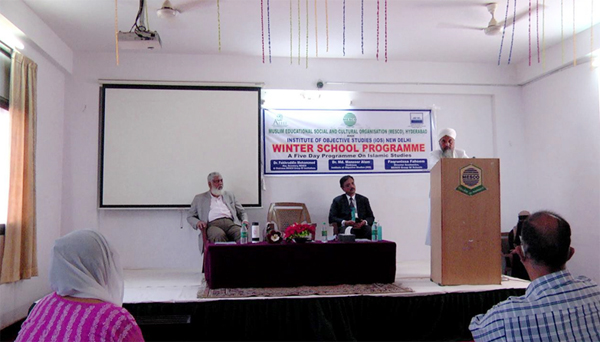
A brief Address by the Chief Guest professor Dr. Syed Jahangir sahib
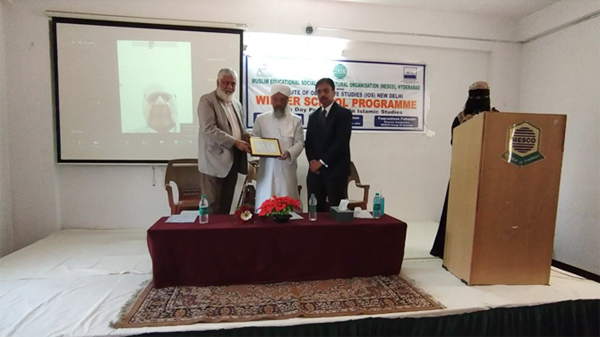
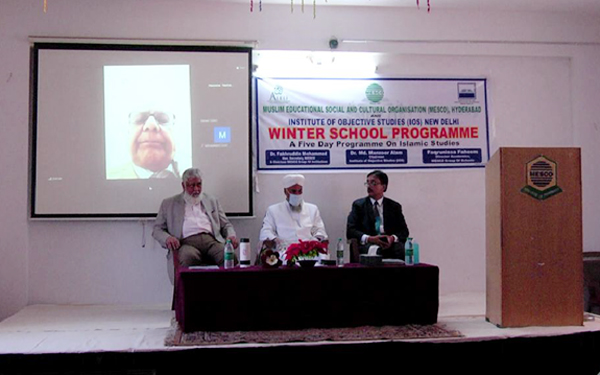
Presidental Address by Professor Z. M. Khan, Secretary General, Institute of objective studies -New Delhi
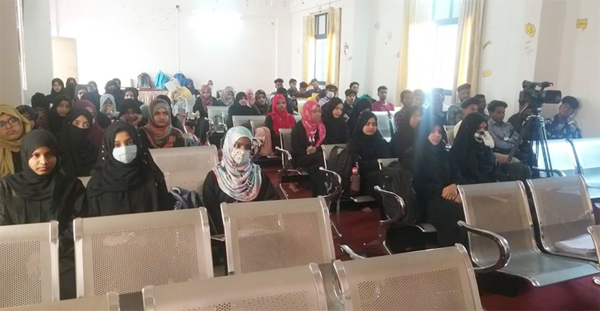
BUSINESS SESSION 1
It started with the topic “Islam as faith and civilisation”. The speaker was Dr Faheem Akhtar Nadwi, Professor Islamic Studies, Maulana Azad National Urdu University. He highlighted the self-understanding of Islam and Islamic world and its significance. He talked about the Quran and Prophet Muhammad (PBUH) as the messenger of God. He emphasised the doctrine of belief, including prophecy and revelation. He talked about human nature, the Quranic view of men and women, the divine law of Islam, the spread of Islam outside the Arab and Persian world, up to the present day. He also highlighted the central pillars of Islam as well as the notion of holy war in the way of God.
BUSINESS SESSION 2
Dr. Fatima Parveen former HoD Urdu deptt., Osmania University, on "Aqeeda, tawheed, risalat akhirat". She highlighted the issues related to the belief of Muslims in Islam. She said about the world hereafter the Prophet Muhammad (PBUH) taught us to tread on the righteous path and reach akhirat, by offering salat on time and following Islamic tenets.
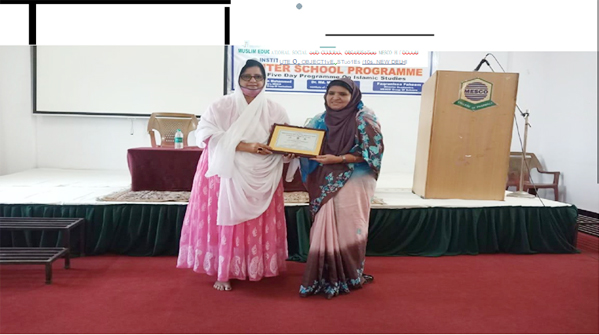
DAY TWO
Day two was divided into three business session followed by five lectures.
BUSINESS SESSION 1
In the first lecture by Dr. Syed Iftekhar Hussain, HoD ALEEF, MESCO was on “Jama wa Tadween Quran”. He highlighted the idea of compilation of the Quran originated when a great number of sahaba went in a battle during the rule of Hazrat Abu Bakar Siddique. Muslims won the battle. There were fewer casualties, but among those who embraced shahada, many were hafiz-e-Quran. Observing this, Hazrat Umar Farooq got worried, What if huffaz continued dying in large numbers. We would be soon short of people who have learned the Quran by heart. The Quran would face similar situations to what other divine books were facing. Umar shared his thoughts with Abu Bakar and suggested the compilation of the Quran in the form of a book.
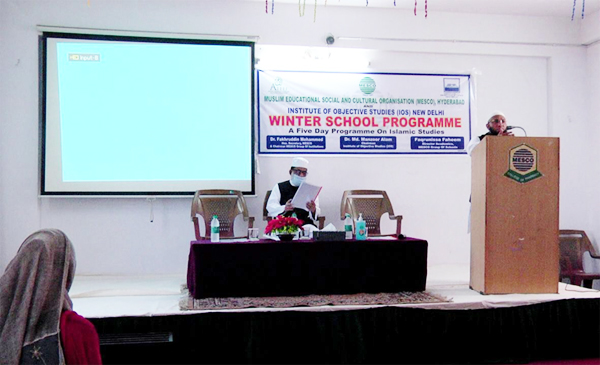
The second lecture was by Maulana Mohammad Ghayasul Islam Rahmani, former director, MESCO-ALEEF, on Jama wa tadween Hadith. It preserved Hadith and became a source of inspiration for Muslims.
BUSINESS SESSION 2
It started with Mr Lateef Ateer’s lecture. Mr Ateer is deputy secretary academics TMREIS (Telangana state minority residential schools). His topic was Arab Muslim contribution to medicine, mathematics and other sciences. It was an interactive session. Every student present in the auditorium enjoyed listening to him and learnt many things which they were unaware of. His main purpose was to make students aware that Muslims were the first in inventions in different field of mathematics, physical and social sciences. The contribution of women to science was also highlighted.
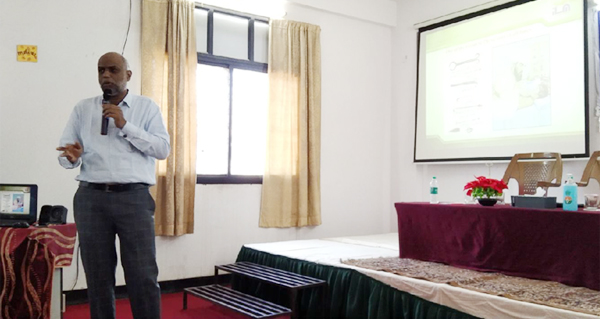
BUSINESS SESSION 3
"Revelation and its application, Sunaah as source of Shariah, which led to emergence and development of fiqh" by Mufti Omer Abideen of Fiqh Academy (Online from Dubai) was about Muslims regarding the Quran as the most important miracle of Muhammad (PBUH). It was the proof of his prophethood and the culmination of a series of divine messages drawn from the Quran which is the incomparable, infallible and final revelation from God. He said that the Quran completes and supersedes all previous revelation. Hadith is a second major source of Islam.
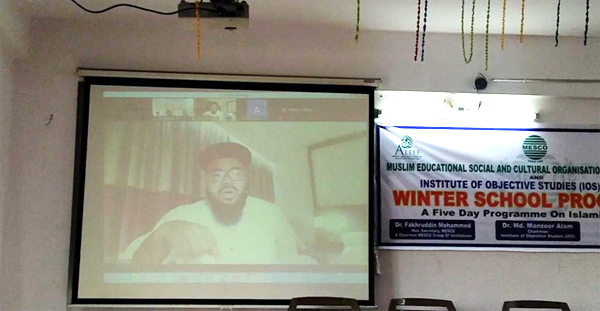
Dr. Kaleem Ahmed Jaleeli, HoD, deptt. of Physics, Nizam College talked on a “Critique of globalisation”. According to him, globalisation is much less of a reality in other fields than it is in the economic one. Cultures till display strong national, regional and local variations. While English is clearly emerging as the common world language, at least as a second language, minority languages are making something of a comeback, mainly in developed countries. He highlighted Arabic as the main language from the olden days.
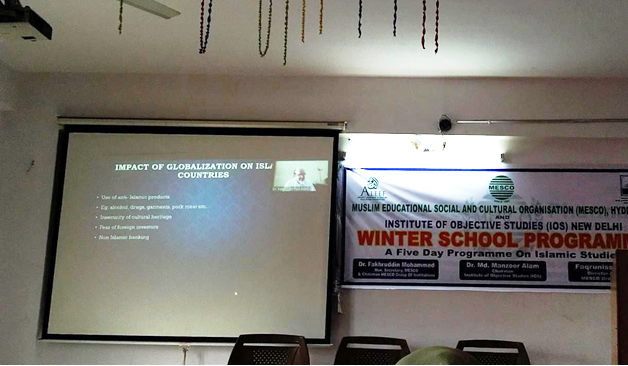
DAY THREE
BUSINESS SESSION 1
“Non-Muslims during the time of prophet (PBUH)” was the topic of Mohtarma Akheela Khamooshi.
Prof. Obaidullah Fahad, deptt. of Islamic Studies, Aligarh Muslim University, talked on “Non Muslims during the time of Prophet (PBUH) and the Rashidun caliphate” He took the examples of some non Muslims influenced by Muslims and said, Muhammad (PBUH) was the man of the hour. In order to understand his wonderful success, one must study the conditions of his times. More than five and a half centuries had elapsed since Jesus when he came into the world. At that time, the old religions of Greece and Rome, and of the hundred and one states along the Mediterranean had lost their vitality. Michael H Hart, in his book The 100 has ranked the great men in history with respect to their influence on human history. He ranked the holy Prophet as the most influential man in human history.
Syed Omer Farooq, asst. professor, MANNU, talked on “Islam and knowledge”. He spoke about the life of the Prophet's (PBUH), In Makkah, he had a small following. In Madinah, he had many more and soon acquired an influence that made him a virtual emperor. During the next few years, while Muhammad’s (PBUH) following grew rapidly, a series of battles were fought between Madinah and Makkah. This war ended in 630 with Muhammad’s (PBUH) triumphant return to Makkah as conqueror. The remaining two and a half years of his life witnessed rapid conversion of Arab tribes to the new religion. When Muhammad (PBUH) died in 632, he was the effective ruler of all of southern Arabia.
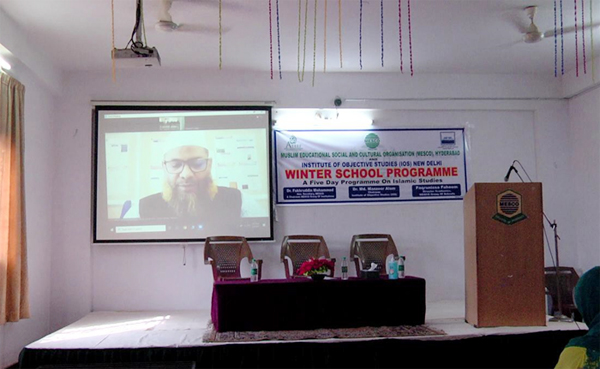
BUSINESS SESSION 2
“Non Muslims during the time of Prophet (PBUH) and Rashidun caliphate” was the topic of Prof. Obaidullah Fahad, The Rashidun caliphate refers to the rule of first four caliphs after the death of the Prophet Muhammad (PBUH) after his death in 632 CE (AH 11).
“Islam and Secularism” was G.Q. Haqqani’s topic. He is MESCO College’s senior faculty. He said secularism has no place in the lands of Islam for two reasons: The first of these is that Islam is the religion that Allah sent down to replace the previous manifestations of faith and to govern all aspects of life. The simplest Muslim can see how Islam explains all matters in detail.
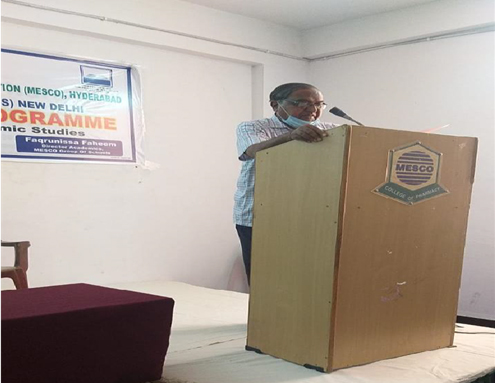
BUSINESS SESSION 3
“Responsibilities of youth towards the state and citizens” was the topic of Prof. M. Afzal Wani, professor of Law GGSIP University. What are the responsibilities of youth? he asked. The youth, the future of the nation and the people who have the power and the destiny to change the nation have certain responsibilities towards the country. The youth is often considered the most powerful part of the population and that is a correct way to describe the youth, he observed.
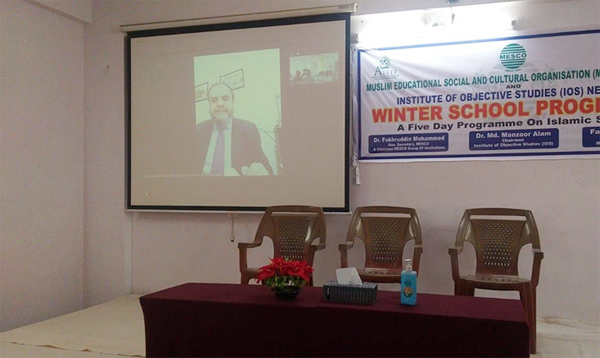
Prof Haseena Hashia, former professor in the department of geography, Jamia Millia Islamia, New Delhi, talked on "Islam and terrorism". She spoke about Islam as a religion of peace. The word Islam has been derived from an Arabic word meaning peace. Islam has laid rules for believers, based on justice, harmony, honesty and coexistence. Even in war, a code of Islamic conduct is there. Children, women and the disabled should not be harmed. Even flora and other living things should not be harmed, according to Islam. No religion teaches and approves acts of terror. Mrs Indra Gandhi was killed by a Sikh, Mahatma Gandhi by a Hindu. This does not mean whole communities should be condemned and made responsible for these heinous acts. Individuals are responsible. But terror and terrorists should be condemned at all levels. Prof. Hashia presented various verses from the holy Quran to prove that Islam is a religion of peace. She highlighted the various forms of torture prevalent in the world and asserted Islam rejects and condemns all these.
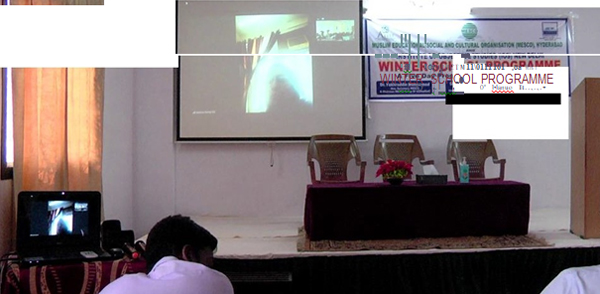
DAY FOUR
BUSINESS SESSION 1
Prof Mirza Asmer Beg, of deptt. of political science, AMU, spoke on “Globalisation, Definition and Impact”. He said, Many people debate the impacts of globalisation and discuss the for and against conditions for it. Globalisation implies that something new is happening to the world. It leads to interconnection between countries of different cultures, races and religions.
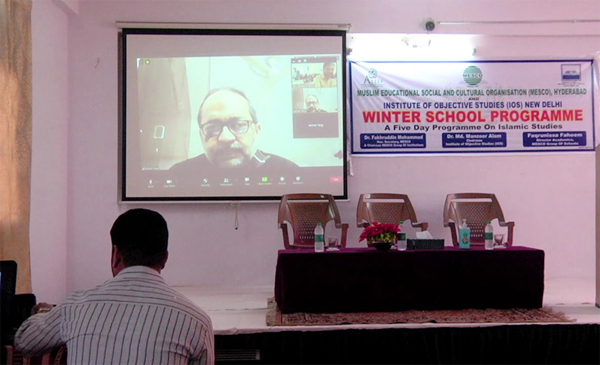
“Islamic states in the world” was the topic of Mohammad Masood Ahmed, director, MIMCS, According to him the Muslim population in the world stands at second followed by other religion. He took the statistical details of the economy in the series of languages spoken education both gender and country wise and education policies, education standards, etc.
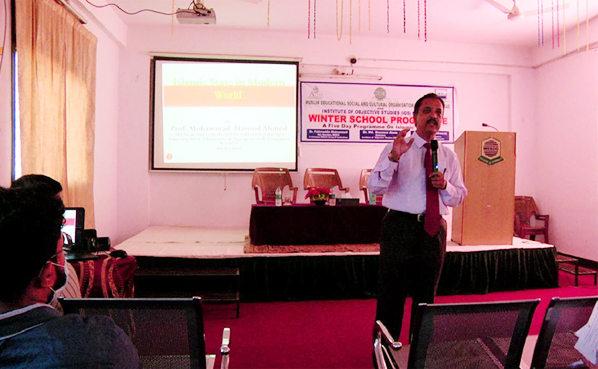
BUSINESS SESSION 2
“Muslims under the Muslims Empire Umayyads of Spain, Abbasids, the Ottomans” was the topic of Mohammad Naseeruddin, MESCO senior faculty. He emphasised mostly the empire of Ottomans which conquered European and Asian countries and spread Islam not with the force of sword, but with superior morals.
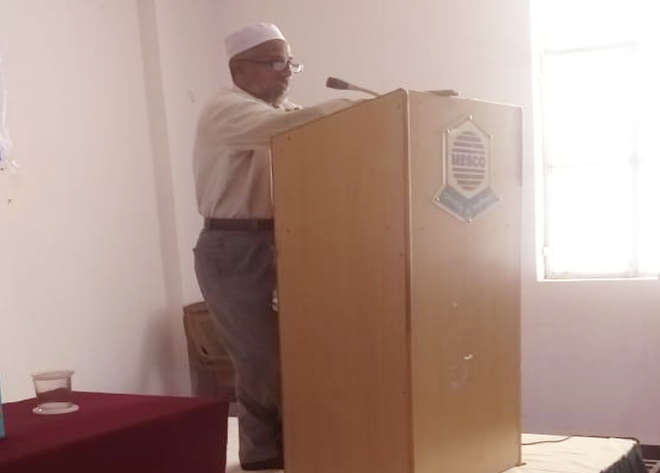
BUSINESS SESSION 3
Mr. Hamid Hussain, lecturer MESCO Degree College, delivered a lecture on “Islam, Modernity and Westernisation” and said that Islam is a complete religion which guides in all aspects of human life. It is realistic. It doesn’t give any scope for old age homes.
According to Islam, Muslims respect their parents and take cares of old people. According to a Hadith the Prophet (PBUH) said, “Every righteous person who casts a look of mercy and affection upon his parents shall be granted, for every look of his, rewards equivalent to that of an accepted Hajj”.
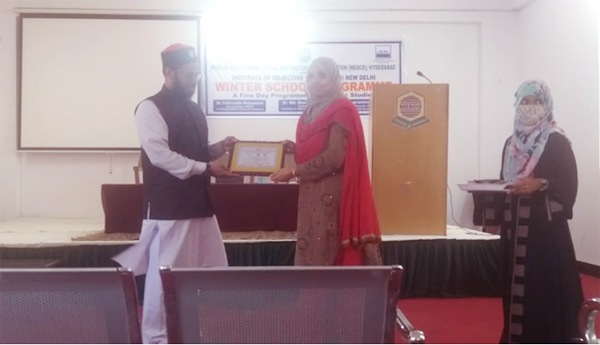
In Western culture sending parents to old age home is not discouraged. The Western culture actually began in the 16th century and they started the movement of “freedom of thinking”. The effects of Western culture started on Muslims from 1857 when the British conquered Delhi.
“Islam and liberalisation movement” was the topic of Khaja Hasan uddin Anas, member managing committee, Ayesha Niswan. He said that in current political discourse the “Muslim question” in India is not articulated in terms of demands for equity. Instead, the political leadership camouflages real issues of backwardness, prejudice, and social exclusion with the rhetoric of identity.
DAY FIVE
BUSINESS SESSION 1
Mohammad Ihteshaam uddin Aziz, research scholar, Nizam College, spoke on “Islam and Multiculturalism”. According to him it is difficult to find a country in the world that has absolute uniformity in terms of religious identity. Whether it is the Jewish state of Israel, the heartland of Islam, or the Catholic states of southern and Western Europe, no state today is completely devoid of religious diversity. In attempting to cope with this challenge, academics, non-governmental organisations and others made the protection of ethnic and cultural minorities a subject of great consideration in the European Union. The results were more imaginative models upon which the state could be based in order to manage such diversity.
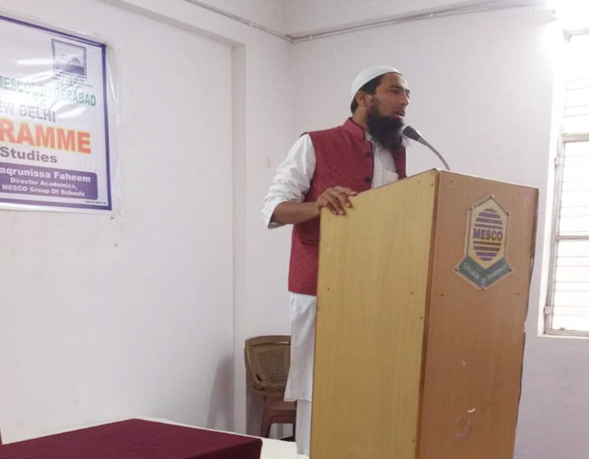
“Islam’s Contribution to humanities and social sciences” was Mohammad Abdul Saleem’s topic. A research scholar at Nizam College, Abdul Saleem said Islam unified science, theology, and philosophy. Muslims were commanded by Allah to study, seek knowledge, and learn and benefit from others’ experiences.
Prof Syed Jamal ud Din, former professor of Jamia Millia, New Delhi, spoke on “Non-Muslims under Muslim rule in India”. According to him Muslims are governed by Muslim Personal Law. The Personal Law play a vital role in reconciling the conflicting interests of individuals. In India in personal matters, there is no national or regional law. Personal Law of a person is not determined by his domicile or his nationality but by his membership of the faith community to which he belongs.
At the valedictory session of the programme, the chief guest was Hazrath Moulana Mufti Khaleel Ahmed Sahab Sheikh-ul-Jamia, Jamia Nizamia, Hyderabad. It was presided by Dr. Ghouse Mohiuddin Ali, president MESCO. The virtual keynote speaker was Prof. Ishtiyaque Danish finance secretary, Institute of Objective Studies, New Delhi. The guest of honour was Mr. Mir Ayub Ali Khan of Siasat.com. This session was followed by distribution of certificates to the students.
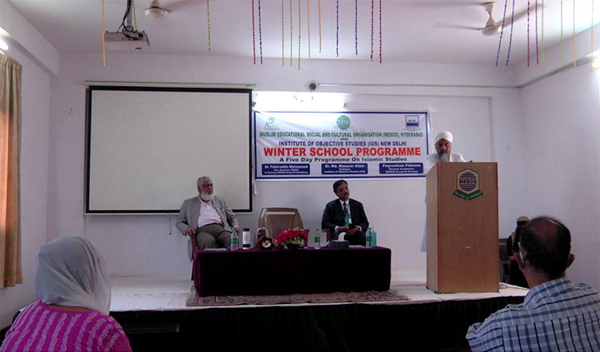
Chief Guest Mufti Khaleel Ahmed Sahab, Shaikhul Jamia, Jamia Nizamia, Addressing the Gathering
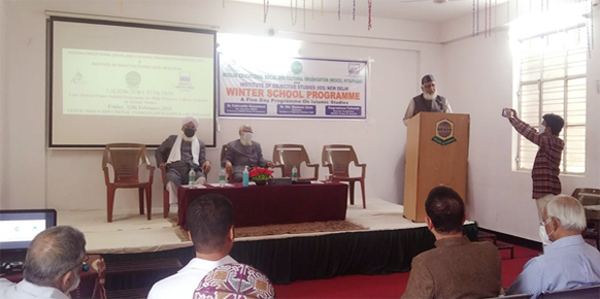
Address by the Hon. Secretary & Chairman MESCO
.jpg)
Valedictory Function Ended with National Anthem
Go Back